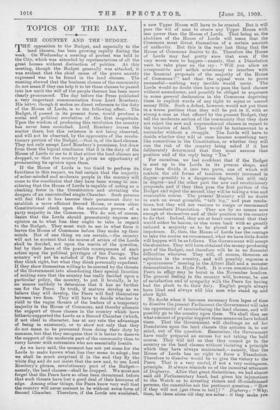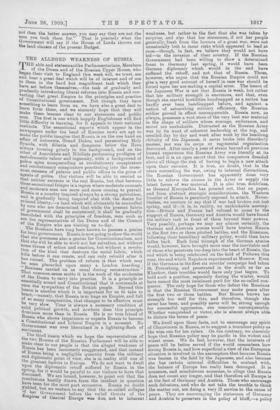TOPICS OF THE DAY.
THE COUNTRY AND THE • BUDGET. THE opposition to the Budget, and especially to the land clauses, has been growing rapidly during the week. On Wednesday a meeting of protest was held in the City, which was attended by representatives of all the great houses without distinction of politics. At this meeting, though the Budget generally was attacked, it was evident that the chief cause of the grave anxiety expressed was to be found in the land clauses. The meeting showed that the business classes of the community do not mean if they can help it to let those clauses be passed into law until the will of the people thereon has been more clearly pronounced. The day before the Press published a. very important communication from Lord Rosebery. His letter, though it makes no direct reference to the duty of the House of Lords, is to the following effect. The Budget, if passed in its present form, would produce a social and political revolution of the first magnitude. Upon the wisdom of producing this revolution the country has never been consulted. Lord Rosebery leaves the matter . there, but this reticence is not being observed, and will not be observed, by the opponents of the revolu- tionary portion of the Budget,—that is, of the laud clauses. They not only accept Lord Rosebery's premisses, but draw from them the logical conclusion that it is the duty of the House of Lords to see to it that either the land clauses are dropped, or that the country is given an opportunity of pronouncing its opinion upon them.
• If the House of Lords is too timid to perform its functions in this respect, we feel certain that the majority of sober-minded and moderate people in the country will come to the conclusion that they have been wrong in con- sidering that the House of Lords is capable of acting as a checking force in tho Constitution and obviating the dangers of an uncontrolled single Chamber. Such persons will feel that it has become their paramount duty to establish a more efficient Second House, or some other Constitutional check upon the autocratic powers of a party majority iu the Commons. We do not, of course, desire that the Lords should prematurely express any opinion as to what line they ought to take in regard to the Budget. They must wait to see in what form it leaves the House of Commons before they make up their minds. But of one thing we are certain,—the country will not be content that the course of action of the Lords shall be decided, not upon the merits of the question, bit by their fears of the possible consequences of such action upon the political privileges of the Peerage. The country will not be satisfied if the Peers do, not what they think right, but what they think personally expedient. If they show themselves willing to be coerced by the threats of the Government into abandoning their special function of making sure that the country has really decided upon a particular policy, the country, to put it brutally, is by no means unlikely to determine that it has no further use for the Peers. In truth, if matters develop as we believe they will develop, the Peers will find themselves between two fires. They will have to decide whether to yield .to the vague threats of the leaders of a temporary majority in the House of Commons, and thereby alienate the support of those classes in the country which have hitherto supported the Lords as a Second Chamber (which, if not ideal in character, has at any rate the advantage of being in existence), or to show not only that they do not mean to be prevented from doing their duty by menaces, but that they recognise that it is better to deserve the support of the moderate part of the community than to curry favour with extremists who are essentially hostile.
As we have said, the moment has not yet come for the Lords to make known what line they mean to adopt ; but we shall be much surprised if in the end they fly the white flag and do not insist that the new and, to use Lord Rosebery's phrase, revolutionary part of the Budget— namely, the land clauses—shall be dropped. We must not forget that the Peers have so often been threatened before that such threats have lost a good deal of their keenness of edge. Among other things, the Peers know very well that the country will never consent to be without some form of Second Chamber, Therefore, if the Lords are abolished, a new Upper House will have to be created. But it will pass the wit of man to create any Upper House with less power than the House of Lords. That being so, the abolition of the .House of Lords will mean that the Commons must divest themselves of a certain amount of authority. But this is the very last thing that the House of Commons desires to do. Therefore the House of Lords may feel pretty sure that even if the very worst were to happen—namely, that a Dissolution were to take place ou the cry : " Will you allow an irresponsible and selfish aristocracy to interfere with the financial proposals of the majority of the House of Commons ? " and that the appeal were to prove successful—nothing very terrible would occur. The Lords would no doubt then have to pass the land clauses without amendment, and possibly be obliged to acquiesce in some general declaration in the Commons depriving them in explicit words of any right to reject or amend money Bills. Such a defeat, however, would not put them in a worse position than they will be put in if, with so strong a case as that offered by the present Budget, they tell the moderate section of the community that they dare not reject the new and unprecedented clauses in regard to the taxation of land. That would be tantamount to a surrender without a ntruggle. The Lords will have to decide whether they will at once become something very like nonentities in the Constitution, or whether they will run the risk of the country being asked if it has deliberately determined that they must assume that position and of the reply being " Yes."
For ourselves, we feel confident that if the Budget is sent up to the Lords in its present shape, and they then divide it into two parts, one of which will contain the old forms of taxation merely increased in degree—possibly to a dangerous degree, but still only in degree—and the other part the new and revolutionary proposals, and if they then pass the first portion of the Budget and reject the second, they will be taking a wise and reasonable course. The present Ministry will no doubt in such an event grumble, " talk big," and pass resolu- tions, but they will not venture to resign or recommend an immediate Dissolution. They are by uo means sure enough of themselves and of their position in the country to do that. Indeed, they are at heart convinced that they would 'either be beaten, or else come back with so greatly reduced a majority as to be placed in a •position of impotence. If, then, the House of Lords has the courage to take the course we recommend, what we have little doubt will happen will be as follows. The Government will accept the situation. They will have obtained the money-producing part of the Budget, and therefore will be in no financial difficulties whatever. They will, of course, threaten an agitation in the country, and will possibly organise a " spontaneous " meeting in the Albert Hall and a monster demonstration in Hyde Park. It is even conceivable that Peers in effigy may be burnt in the November bonfires. The general feeling in the country will, however, be one of satisfaction and of sympathy with the Peers for having had the pluck to do their duty. English people always have liked and always will like men who stand up and show fight.
No doubt when it becomes necessary from lapse of time to dissolve the present Parliameut the Government will take the opportunity of reintroducing the land clauses, and will possibly go to the country upon them. We shall then see what amount of popular support these measures have behind them. That the Government will challenge an ad hoc Dissolution upon the land clauses this autumn is, to our mind, out of the question. Remember; the Government have ready prepared an excuse for not taking the bold course. They will tell us that they cannot go to the country on the land clauses without violating a principle which they have always maintained,—namely, that the House of Lords has no right to force a Dissolution. Therefore to dissolve would be to give the victory to the Peers. That is a very useful, if not a very courageous, principle. It always reminds us of the immortal utterance of Dogberry. After that great dialectician, we had almost said old Parliamentary hand, had given his injunctions to the Watch as to arresting rioters and ill-conditioned persons, the constables ask the pertinent question : " How if they will not [get them to bed] " Dogberry: "Why, then, let them alone till they are sober : if they make you not then the better answer, you may say they are not the men you took them for." That is precisely what the Government will say if the House of Lords throws out the laud clauses of the present Budget.



























































 Previous page
Previous page